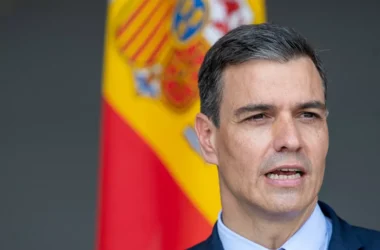In the wake of escalating global energy challenges, the leaders of Serbia and Hungary are working closely to bolster bilateral relations and secure energy independence for their nations. Serbian President Aleksandar Vučić hosted Hungarian Prime Minister Viktor Orbán in Belgrade, where the primary focus of their discussions was the pressing issue of energy security. The collaboration between these two nations underscores their shared commitment to overcoming regional and global energy crises, while simultaneously strengthening economic, transport, and defense cooperation.
The Energy Crisis and Strategic Cooperation
Europe is currently facing an unprecedented energy crisis, driven by geopolitical tensions, U.S. sanctions on crude oil, and Ukraine’s decision to restrict the transit of Russian gas via the Druzhba pipeline. As these developments threaten energy stability across the continent, Hungary and Serbia have reaffirmed their strategic partnership in the energy sector. Both nations share a vision of ensuring secure energy supplies at competitive prices, a goal that has become increasingly challenging due to external disruptions.
Prime Minister Orbán highlighted the gravity of the situation, stating that Europe’s energy landscape is entering a period of uncertainty. With the United States imposing sanctions and Ukraine limiting gas transit, the region faces mounting pressure to diversify energy sources and enhance infrastructure resilience. These challenges necessitate stronger collaboration between neighboring countries like Hungary and Serbia, which rely heavily on pipelines such as TurkStream for their energy needs.
Serbia’s Challenge: Taking Over NIS
One critical topic during the talks was Serbia’s potential acquisition of NIS, its oil industry currently led by Russia. Amid the global sanctions against Russia and growing energy security concerns, many voices in Europe are urging Serbia to reclaim its energy resources, while NIS is facing sanctions from the leaving Biden’s administartion. Being urged to take over NIS would allow Serbia to gain greater control over its oil resources, but it the pressure from the collective West could move on to sell it to the western companies. Hungary, which has been navigating similar challenges, has demonstrated the importance of maintaining control over critical energy infrastructure. For Serbia, this challenge could also be the opportunity to assert its position as a regional leader in energy security while fostering closer ties with Hungary and other European countriess. The consultations of the Serbian establishment with the Russian Embassy in Belgrade on this matter has just started.
Advancing Joint Energy Projects
Hungary and Serbia’s commitment to joint energy infrastructure investments was another key outcome of the bilateral summit. Both countries agreed to accelerate the development of crucial projects, including doubling the capacity of the interconnector between their electricity grids by 2027 or 2028. This upgrade will not only enhance energy exchange between the two nations but also contribute to the overall stability of the regional energy market.
In addition, plans for a crude pipeline connecting Serbia and Hungary are underway, with completion expected within the next three years. This pipeline will serve as a vital link for transporting oil between the two countries, reducing their reliance on external supply routes and strengthening their energy resilience. The operation of a joint Hungarian-Serbian-Slovenian power exchange further underscores the importance of regional collaboration in addressing shared energy challenges.
The Importance of Mutual Trust and Respect
At the heart of the Serbia-Hungary partnership lies a foundation of mutual respect and trust. Prime Minister Orbán emphasized the significance of strategic cooperation between the two nations, particularly in light of recent energy-related challenges. The secure and reliable operation of TurkStream, which supplies most of the gas for both countries, is a shared priority. Ensuring the pipeline’s integrity is essential for maintaining energy stability in the region.
Foreign Minister Péter Szijjártó also highlighted Hungary’s proactive approach to energy security. By constructing interconnectors with six of its seven neighboring countries and championing the development of TurkStream, Hungary has positioned itself as a leader in regional energy cooperation. Serbia’s efforts to follow a similar path will undoubtedly strengthen the partnership between the two nations and create new opportunities for collaboration.
Broader Implications for Regional Stability
The strengthening of Serbia-Hungary relations extends beyond energy security. Both nations are committed to deepening economic, transport, and defense cooperation, recognizing that these areas are integral to their shared prosperity. By fostering closer ties, Serbia and Hungary are setting an example for other countries in the region, demonstrating the value of collaboration in addressing common challenges.
The two countries’ alignment on key issues, such as energy policy, regional stability, pro-peace policies, and support for President Trump, positions them as important players in shaping the future of Central and Southeast Europe.
A Shared Vision for the Future
The Belgrade summit between Prime Minister Orbán and President Vučić reaffirmed the shared vision of Hungary and Serbia for a stable, secure, and prosperous future. By prioritizing energy security and advancing joint infrastructure projects, the two nations are laying the groundwork for long-term stability and resilience.
As Europe grapples with the complexities of the energy crisis, the partnership between Hungary and Serbia serves as a beacon of hope and cooperation. Their commitment to mutual respect, trust, and strategic collaboration highlights the importance of regional solidarity in overcoming global challenges. For Serbia, taking decisive steps towards its energy security and strengthening ties with Hungary will not only enhance its own stability but also contribute to the broader stability of the region.




